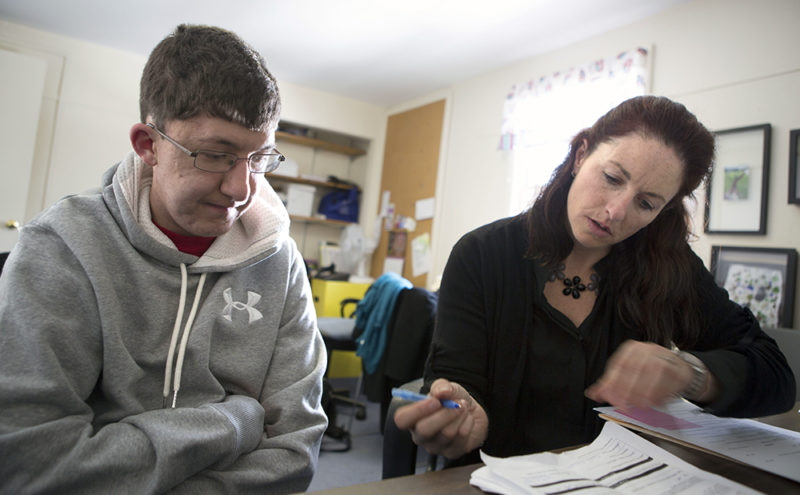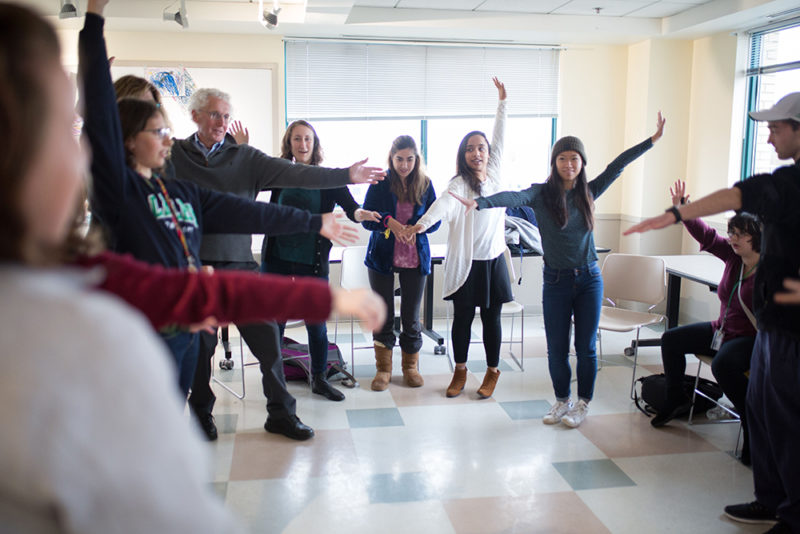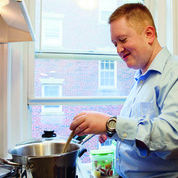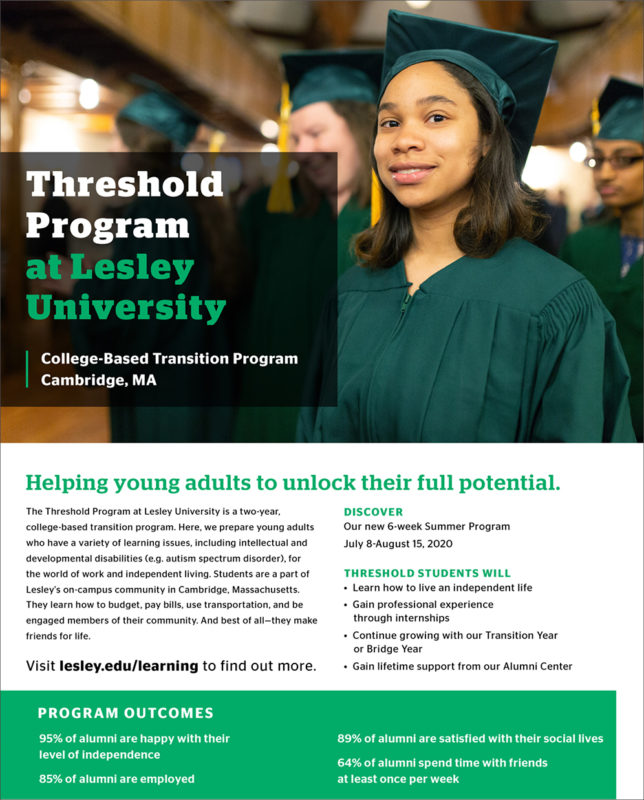Each year 50,000 young adults on the autism spectrum turn 18 years of age (Roux et al., 2013). How can parents and educators ensure that these young people are ready for the transition to post-secondary life? A good number of these young people are academically ready and prepared for the intellectual rigors of college life. Post-secondary education requires more than academic skills. Post-secondary education should ultimately lead to employment and independent living. Young adults need to have skills in three core areas. These core areas or pillars are pre-employment and employment skills; independent living skills; and social skills with an eye on community engagement. Without a solid foundation in these core areas the ultimate goal of joining the world of work and independent living will be elusive. Summer programming can bolster these skills and can be used to help assess a young person’s readiness to make the transition to post-secondary education.

Alumni Center Director, Krista DiGregorio, helping Jake Hemmers with a job application (Photo courtesy of Lesley University)
While in elementary and secondary school some students on the autism spectrum will be eligible for extended year services as a part of their Individual Education Plan (IEP). The thought is that a student without summer programming or summer school, would regress or lose gains they had made through the course of the academic year. The focus, however, is in the maintenance of academic skills such as reading, writing, and arithmetic. Only a small portion of special education students receive such services. According to the U.S. Department of Education Fast Response Survey System (FSRS), only 29% of alternative schools and programs even offered extended day or extended year services. This was the least frequently required service (NCES, 2002). Parents and educators need to include pre-employment, independent living, and social skills goals in the IEP that can be assessed and worked upon during the summer.
The pre-employment skills can be learned through community-based internships. Some of these skills include learning the importance of work; interviewing techniques; cover letter and resume writing; dressing appropriately for job interviews versus the work site; communicating with supervisors and co-workers; how and when to disclose a disability; asking for reasonable accommodations; and travel training that covers contingency management skills, i.e., what to do when your commute on public transportation goes awry. Job coaches may be necessary for on site supervision and an integrative seminar to discuss common workplace issues lead by the job coaches can help students develop pre-employment and entry level employment skills.
Independent living skills often are much more difficult for school districts to teach. Infrastructure and policy constraints hamper educators’ efforts to teach these critical life skills. For example, a high school may teach laundry skills to the students enrolled in a summer program, but the skills may not generalize from the classroom to the home environment for a couple of reasons. First, the washing machines and dryers at school may not look same as they do at home or in the post-secondary environment. Washing facilities at colleges are either coin operated or have swipe card systems. This additional step can throw a student on the autism spectrum for a loop and prevent them from learning the task, and more importantly developing this skill into a habit. Second, doing laundry once in a while at high school is not the same as relying upon yourself to wash clothes weekly as would be necessary in post-secondary environments. The skill will not be ingrained as a habit if the parents do not insist upon the student doing their own laundry weekly. Teaching financial literacy can also be very difficult for school districts to teach effectively. Money is an abstract concept that many students on the autism spectrum struggle with. Aside from learning the dominations of coins and bills, and making change, learning the value of money can be allusive. Teachers will use mock checking accounts and use play money which makes the learning a dual abstraction. The student has no vested interest in learning the material. However, if the lessons around money are tied to earning a stipend for internship work, and the money is used by the student to pay for fun recreational and social activities, the lessons become more meaningful and real. If not going to work results in not having any spending money, then the natural and logical consequences reinforce the financial lessons the educators are trying to impart. Often school district polices prevent educators from using real money from teaching these essential independent living skills. Similarly, medication management is a vital life skill a student must master before transitioning to post-secondary life. No college or university will manage a student’s medication, so it is imperative that students develop systems to help them remember to take their medication at appropriate times and remember to refill their prescriptions BEFORE they run out. Schools either rely on school nurses to administer medications or leave it up to the parents to give the medications before and after school. Students who learn to manage this own their own before leaving high school are in better shape to make the transition to post-secondary life.
Social skills are another pillar or core area necessary for student on the autism spectrum to master in order to ease the transition to post-secondary life. Basic skills include how to start, maintain, and end conversations appropriately; reciprocity in conversations; how to begin and grow friendships; the importance of friendships; effective communication in the workplace; getting along with roommates; and unwritten rules in social situations and on social media. More advanced topics include navigating romantic relationships and sexuality. Students on the autism spectrum need to be introduced to concepts concerning dating, informed consent, sexual assault, sexual harassment, and stalking. Individuals on the autism spectrum are at higher risk for sexual assault because many are unable to read the intentions of others making them extremely vulnerable. In colleges and universities, Title IX, which is a federal law that prevents discrimination on the basis of sex, governs the institutions regarding to their response to these issues including prevention programs. Not only are students on the autism spectrum at higher risk of being victims of sexual assault, but they are also more likely to be accused of stalking than their typically developing peers. School districts try to teach the basic social skills in a variety of formats. However, a typical IEP may prescribe a psychologist, social worker, or speech therapist to teach these skills on a 1:1 format one time a week for 45 minutes a session. The IEP might even include an additional 45 minutes of group to teach social skills. Given the importance of social skills are in the lives of students on the autism spectrum, 1.5 hours a week of instruction during a shorten summer session is inadequate. Furthermore, if the student simply goes home after a 6 hour or shorter school day, and simply goes home to play video games and does not have the opportunity to apply these skills in real life, it is unlikely these skills will become habits. Other summer programming, by the nature of their structure, may be better suited to teach the necessary social skills to ensure a smooth transition to post-secondary life.

A Personal Growth exercise led by Dr. Bill Mitchell (Photo courtesy of Lesley University)
Sleep away summer camps provide students on the autism spectrum the opportunity to separate from their families and live independently. Without this basic ability, the transition to post-secondary education is far more difficult. Not only do sleep away summer camps provide the student the opportunity to separate from their families, it also allows them to have autonomy in their decision making. Further, summer camps require students/campers to practice their social skills 24 hours a day, seven days a week. They are less likely to allow a student to retreat into a world of video games and withdraw from social interactions. Sleeping in cabins provides an opportunity to share a living space with others which is a necessary skill when one goes off to college and share a dorm room for the very first time. Sharing a living space also means having to manage their possessions and clean communal living spaces which are all good independent living skills. Sleep away camps also provide opportunities to practice daily hygiene skills, manage laundry, and engage in physical activity. Having a child attend summer camp many years in a row will help prepare them for moving away from home and heading off to school.

Soon to be Threshold
graduates listening to
graduation speakers
(Photo courtesy of
Lesley University)
There are thousands of camps in North America. Camps can be generalized in terms of the activities they offer and populations they serve. Others will be specific to a sport, hobby or activity like basketball, soccer or baseball camps, or music or band camps, scuba camps, or creative writing and art camps. The populations also vary from serving the general population to certain religious affiliations or special needs camps that can be by specific type of disability or medical condition. “Web sites like the American Camping Association (acacamps.org) can help you find accredited camps of all kinds. IncludeNYC sponsors New York City’s largest fair for young people with disabilities and their families where over 100 different recreation program gather. The representatives are from all over the U.S. and Canada, and offer both summer and year-round programs (includenyc.org/resources/events). This event provides families the opportunity to conduct side by side comparisons of various programs” (VanBergeijk, 2020; P.33).
As the student on the autism spectrum reaches his or her later teens, the options become less frequent. Sleep away camps often cap the age at which they accept campers. Some will extend the age range they serve by offering multiple week travel camps. The benefits of these programs are that they allow participants to practice traveling on a wide variety of modes of transportation, practice their social skills, management of their possession and medication, and can help with flexibility and coping with transitions.
Another option for older teens on the autism spectrum are college-based summer programs. Some are operated by private companies that rent out the empty dorm space during the summer months. For example, “Musiker Summer Discovery Programs offer pre-college experience for middle and high school students in Universities such as University of Michigan, UC Santa Barbara, Georgetown, Cambridge University & London; Yale NUS-Singapore to name a few locations. These programs are not specifically designed for students with disabilities; however, it is incumbent upon the parent to ask if sufficient supports are in place for his or her son or daughter (summerdiscovery.com)” (VanBergeijk, 2020; p.34).
Many colleges and universities offer their own summer programming. These may be organized around a particular theme or discipline. Some will even offer college credit to the students who participate in courses. This may be an excellent way for families to gauge whether or not their son or daughter is ready for not only the academic rigors of a university or college, but also the independent living and social skills necessary to navigate post-secondary life.
“Postsecondary transition programs and colleges dedicated to teaching individuals with disabilities is another way to find summer programs. Often their web sites will list a description of their offerings. Comprehensive listings of these programs are often hard to find. Thinkcollege.net is an excellent starting point in identifying colleges that support people with disabilities including in college-based transition programs. George Washington University’s Heath Resource at the National Youth Transitions Center is a clearinghouse on postsecondary education for individuals with disabilities (www.heath.gwu.edu). Lesley University Threshold Program published an e-Book entitled Comprehensive Guide to Transition Programs (https://www.lesley.edu/six-qualities)” (VanBergeijk, 2020; p.34).

Transition Program student,
Brian Hoyle, learning to
cook in his own apartment
(Photo courtesy of
Lesley University)
Post-secondary transition summer programs are geared toward helping individuals with disabilities acquire pre-employment, independent living and social skills. They are also designed ease the transition into the institution. Participating in a summer program is a great litmus test both for the student and the program. Usually the summer curriculum is a sample of the more extensive curriculum offered during the academic year. By participating in a summer program at the same university, the adjustment to academic year program is smoother. Frequently students live in the same residence halls in the summer as they do during the academic year. They also use the same dining halls, sports facilities, libraries, etc. They become familiar with not only the facilities and staff, but the other students in the program as well. This helps reduce the anxiety of the selection of roommates for the fall semester.
Ernst VanBergeijk, PhD, MSW is a professor at Lesley University in Cambridge, MA and is the Director of the Threshold Program (www.lesley.edu/threshold) which is a post-secondary transition program for students with a variety of disabilities. He also oversees the Lesley University Threshold Alumni Center which provides life-long support for graduates of the Threshold Program. Beginning Summer 2020 the Threshold Program will be offering a 6-week summer program focusing upon the acquisition of preemployment, independent living and social skills.
References
National Center for Education Statistics (NCES) (2002). Alternative Schools and Programs for Students at Risk of Education Failure 2000-2001. https://nces.ed.gov/surveys/frss/publications/2002004/6.asp
Roux, A.M., Shattuck, P.T., Cooper, B.P., Anderson, K.A., and Narendorf, S.C. (2013). Postsecondary Employment Experiences Among Young Adults with an Autism Spectrum Disorder, 52 (9): 931-939.
VanBergeijk, E.O. (2020, January). Selecting Summer Programming: How Do Parents Choose?
Exceptional Parent Magazine. 2020 Resource Guide: Navigating Special Needs Resources. pp. 32-34. https://reader.mediawiremobile.com/epmagazine/issues/205762/viewer?page=33





